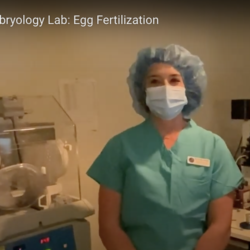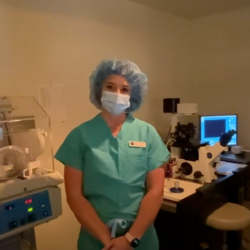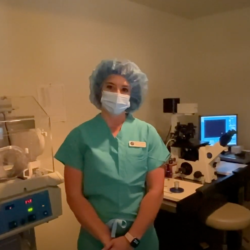
At The Fertility Institute, we help couples achieve their dreams of having a successful pregnancy. Many of our patients undergo the fertility treatment, in vitro fertilization (IVF). Ovulation induction is one of the key stages of IVF, but people also use it as a fertility treatment in its own right. Here’s what you should know about this approach, especially as it relates to IVF.
What is ovulation induction?
Your ability to get pregnant is controlled in large part by your ovarian cycle. During the follicular stage of your ovarian cycle, hormones stimulate the follicles in your ovaries to develop a mature egg. Once the egg is released, it travels to the fallopian tubes where conception may take place by the sperm.
For some women, ovulation doesn’t take place at all (called anovulation). Others suffer from irregular periods, where ovulation doesn’t occur regularly or often.
For these women, ovulation induction can help. Ovulation induction is the process of using hormone-based medications to stimulate the production and release of a woman’s eggs.
The basics of ovulation induction and IVF
This ability to initiate and control the ovulation cycle helps increase success rates of IVF. For the right candidates, IVF can dramatically improve a couple’s chances of a successful pregnancy.
Ovulation induction is an essential part of the IVF process. By using ovulation, your fertility team is able to obtain a higher number of mature eggs than would be possible with a normal cycle. It also allows them to retrieve eggs at precisely the right time, when they are fully mature but have not yet been released by the ovaries.
The use of fertility medications encourages the production and maturation of multiple eggs, increasing the chances of successful conception. Any extra embryos can be frozen and used in future IVF cycles, eliminating the need to repeat the ovulation induction stage.
How does ovulation induction work?
Before inducing ovulation, your fertility team will take blood samples and perform a transvaginal ultrasound in order to confirm your ovulation cycle. They’ll likely also ask you to begin tracking your ovulation cycles. You can do this with an ovulation predictor kit or be measuring your basal body temperature.
About a week before your new cycle begins, you’ll receive medications that prevent premature ovulation. The medications that are generally used include both tablets you take by mouth and injectable medications. They may include:
- Clomiphene citrate (sold under the trade names Clomid® and Serophene®): This medication, administered in tablet form, promotes increased production of follicle stimulating hormone (FSH). FSH can also be directly injected.
- Gonadotropins: This injectable medication induces the release of matured eggs after the follicles have developed.
- Glucophage (Metformin): This insulin-lowering medication is frequently used among patients with polycystic ovary syndrome (PCOS) to reverse the endocrine abnormalities associated with this condition.
Throughout the ovulation induction stage of IVF, your fertility team will carefully monitor your progress through further blood tests and ultrasounds.
Do I need to undergo ovulation induction?
Ovulation induction helps women with fertility challenges conceive. If you’re using IVF to increase your chances of conceiving, ovulation induction will be a key part of the process. Your doctor will work closely with you to find an appropriate medication dosage for you.
You may want to talk to your doctor about ovulation induction—by itself or as part of IVF—if you have irregular periods or don’t ovulate at all. You may have issues with ovulation if you:
- Have thyroid disease, endometriosis, or polycystic ovary syndrome (PCOS)
- Are very overweight or very underweight
- Have exercise-induced amenorrhea, a condition that occurs with low body weight and excessive exercise
- Are tracking your ovulation (by basal body temperature or a predictor kit) and you don’t seem to be ovulating
You may also want to talk to your doctor if you’ve been failing to conceive for 12 months or more (for those under 35) or for six months or more (for those over 35).
Are there any ovulation induction risks?
For all the benefits of ovulation induction, the process does introduce some risks. Most notably, the medications used to stimulate ovulation increases the risk of multiple births. If you do conceive, CHealth notes “there is about a 10% chance of having twins.” In our experience, triplets occur about 1/500 pregnancies and much more often with fertility gonadotropins injects. Also, women with polycystic ovaries are at increased risk of triplets [as great as 1 in 5] pregnancies, especially if they age.
Some women also do experience side effects from these medications, though these are rare and usually mild. Side effects may include:
- Hot flashes
- Breast tenderness
- Mood changes
- Nausea
- Headaches
- Inflammation and soreness at injection sites
In rare cases, you may also have an increased risk of cysts developing on your ovaries. Finally, there is also an increased risk of a rare condition called ovarian hyperstimulation syndrome (OHSS). This can cause severe pain in your pelvic, abdominal, and chest regions. You may also experience rapid weight gain, vomiting, dark urine, dizziness, and shortness of breath. If this occurs, talk to your doctor immediately.
Most cases of OHSS are mild, but if your body is responding too strongly to the ovulation induction medications, your doctor can cancel your IVF cycle during this early phase to avoid the possibility of OHSS. This does not mean, however, that future cycles will not be successful.
Where can I learn more about ovulation induction and IVF?
If you would like to learn more about the stages of IVF, including ovulation induction, please contact the Fertility Institute of New Orleans today. We would be pleased to answer any questions you might have. We can also help you schedule an appointment at one of our three Louisiana office locations.



